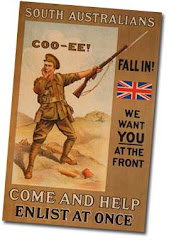
Gordon Campbell was born at Myrtle Bank in 1885, and was one of six sons of Dr Allan Campbell and Florence Ann Campbell (nee Way). His father was a member of the South Australian Legislative Council and has been credited with the establishment of the Adelaide Children's Hospital (now the Women's and Children's Hospital) in 1876. Gordon's maternal uncle Sir Samuel Way was a very prominent leader in the colony, serving as Lieutenant Governor, Attorney-General, Chief Justice, and Chancellor of the University of Adelaide amongst many other important roles. Gordon was educated at St Peter's College, and in his prime was one of the finest all-round athletes and sportsmen in South Australia. While he was still at school his older brothers Allan and Neil served in the Boer War, Allan being killed in action.
During his schooling, Gordon excelled in cricket, football, running, lacrosse and gymnastics, and captained the St Peter's football, cricket and running teams. Gordon went on to the University of Adelaide, and in 1906 graduated with a Bachelor of Arts, then LLB in 1909. While he was at university he captained the University of Adelaide inter-varsity sports team, and captained South Australian sides in both lacrosse and cricket. When available, he also played cricket for the Coromandel Valley 1st XI. After completing his articles with Johnstone and Evans, he was admitted to the Bar in 1911, and before the outbreak of war was practicing as a solicitor and living at Blackwood.
In 1915 he married Iris Fisher, the daughter of Isaac Alfred Fisher, a first class cricket umpire. In May 1915 the family received news that Gordon's brother Neil had been wounded at Gallipoli. In September Gordon enlisted and despite having no military experience whatever, was immediately put on an officer's training course at Mitcham Camp. At the completion of the course he was commissioned as a second lieutenant and allocated to the 10th reinforcements to the 10th Battalion. He joined the battalion on Lemnos on 21 November 1915 after they had evacuated from Gallipoli, and once they arrived in Egypt he underwent training on the Lewis machinegun and was appointed as the officer commanding the battalion's Lewis gun section. In March 1916 he was promoted to lieutenant just prior to the battalion's departure for France.
On arrival in France the battalion's first major action was the Battle of Pozieres. The following is taken from a description of his actions by his commanding officer:
On the morning of 24 July, Lieutenant Gordon Campbell showed great courage dash and ability in a bomb fight which took place in the old German trenches. Not only did he handle his machine guns with marked ability, but he organised and led parties of bombers to the attack, he stood on the parapet and threw bombs into the German trench and although wounded in two places, he continued his work until the enemy were driven out. It was largely due to his work that the enemy were driven out.
For his actions that day, Gordon was awarded the Military Cross.
A week later he was temporarily promoted to captain and took command of Cork Company of the 10th Battalion. His promotion was confirmed in October 1916. In February 1917 he was wounded in the foot during the Le Barque attack, but rejoined the battalion in June. In August he was appointed to command a special company of raiders known as Y Company. The following month he led his company onto the 2nd objective during the Battle of Polygon Wood. His commanding officer wrote:
During this period, Captain Gordon Campbell displayed conspicuous gallantry and devotion to duty in commanding his company with the utmost determination, skill and energy. When the battalion was on the forming up line they were caught in an enemy artillery barrage and became disorganised. By his coolness and determination and utter disregard of his personal safety he re-organised his own company and then assisted in the reorganisation of the remainder of the battalion. Throughout the whole of the operations Gordon Campbell’s work was admirable and he was largely responsible for the success of the operation.
As a result, Gordon was awarded a Bar to his Military Cross. He was the first officer of the battalion to be awarded two gallantry decorations. A few weeks later Gordon commanded the battalion for four days in the absence of any senior officers.
Between February and June 1918 he was hospitalised in England, and after rejoining the battalion was appointed Adjutant. Gordon was responsible for much of the planning for the Battle of Merris in late July 1918, as a result of which Corporal Philip Davey of the 10th Battalion was awarded the Victoria Cross. Gordon was promoted to temporary major in early October 1918, but after a training injury necessitated his evacuation to England, he reverted to the rank of captain. After the Armistice he was involved in the negotiations for the AIF cricket team to tour Britain, and returned to South Australia in May 1919.
After the war Gordon moved to North Adelaide and practiced law. He served as a state vice-president of what is now the Returned and Services League and as president of the 10th Battalion Association. He continued his passion for cricket, serving as a state selector, a member of the Australian Board of Cricket Control and chairman of the South Australian Cricket Association. His other sports interests included roles as chairman of the South Australian Lacrosse Association and president of the South Australian Amateur Sports Association.
Gordon's older brother Lieutenant Neil Campbell was killed in action in April 1918 whilst serving with the 3rd Tunnelling Company near Erquinghem, France.
Gordon died in 1961 at the age of 76 and was cremated at Centennial Park. His name is inscribed on the Blackwood Soldier's Memorial and he is also commemorated on honour boards in Scot's Church, Adelaide and Christ Church Hall, North Adelaide.
Photograph: From the Advertiser, 11 April 1917, p.6







No comments:
Post a Comment